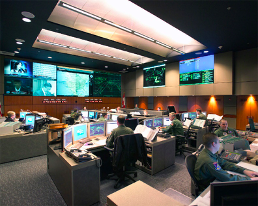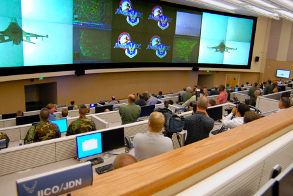11.2: Information gathering/deciphering
- Page ID
- 81969
\( \newcommand{\vecs}[1]{\overset { \scriptstyle \rightharpoonup} {\mathbf{#1}} } \)
\( \newcommand{\vecd}[1]{\overset{-\!-\!\rightharpoonup}{\vphantom{a}\smash {#1}}} \)
\( \newcommand{\dsum}{\displaystyle\sum\limits} \)
\( \newcommand{\dint}{\displaystyle\int\limits} \)
\( \newcommand{\dlim}{\displaystyle\lim\limits} \)
\( \newcommand{\id}{\mathrm{id}}\) \( \newcommand{\Span}{\mathrm{span}}\)
( \newcommand{\kernel}{\mathrm{null}\,}\) \( \newcommand{\range}{\mathrm{range}\,}\)
\( \newcommand{\RealPart}{\mathrm{Re}}\) \( \newcommand{\ImaginaryPart}{\mathrm{Im}}\)
\( \newcommand{\Argument}{\mathrm{Arg}}\) \( \newcommand{\norm}[1]{\| #1 \|}\)
\( \newcommand{\inner}[2]{\langle #1, #2 \rangle}\)
\( \newcommand{\Span}{\mathrm{span}}\)
\( \newcommand{\id}{\mathrm{id}}\)
\( \newcommand{\Span}{\mathrm{span}}\)
\( \newcommand{\kernel}{\mathrm{null}\,}\)
\( \newcommand{\range}{\mathrm{range}\,}\)
\( \newcommand{\RealPart}{\mathrm{Re}}\)
\( \newcommand{\ImaginaryPart}{\mathrm{Im}}\)
\( \newcommand{\Argument}{\mathrm{Arg}}\)
\( \newcommand{\norm}[1]{\| #1 \|}\)
\( \newcommand{\inner}[2]{\langle #1, #2 \rangle}\)
\( \newcommand{\Span}{\mathrm{span}}\) \( \newcommand{\AA}{\unicode[.8,0]{x212B}}\)
\( \newcommand{\vectorA}[1]{\vec{#1}} % arrow\)
\( \newcommand{\vectorAt}[1]{\vec{\text{#1}}} % arrow\)
\( \newcommand{\vectorB}[1]{\overset { \scriptstyle \rightharpoonup} {\mathbf{#1}} } \)
\( \newcommand{\vectorC}[1]{\textbf{#1}} \)
\( \newcommand{\vectorD}[1]{\overrightarrow{#1}} \)
\( \newcommand{\vectorDt}[1]{\overrightarrow{\text{#1}}} \)
\( \newcommand{\vectE}[1]{\overset{-\!-\!\rightharpoonup}{\vphantom{a}\smash{\mathbf {#1}}}} \)
\( \newcommand{\vecs}[1]{\overset { \scriptstyle \rightharpoonup} {\mathbf{#1}} } \)
\(\newcommand{\longvect}{\overrightarrow}\)
\( \newcommand{\vecd}[1]{\overset{-\!-\!\rightharpoonup}{\vphantom{a}\smash {#1}}} \)
\(\newcommand{\avec}{\mathbf a}\) \(\newcommand{\bvec}{\mathbf b}\) \(\newcommand{\cvec}{\mathbf c}\) \(\newcommand{\dvec}{\mathbf d}\) \(\newcommand{\dtil}{\widetilde{\mathbf d}}\) \(\newcommand{\evec}{\mathbf e}\) \(\newcommand{\fvec}{\mathbf f}\) \(\newcommand{\nvec}{\mathbf n}\) \(\newcommand{\pvec}{\mathbf p}\) \(\newcommand{\qvec}{\mathbf q}\) \(\newcommand{\svec}{\mathbf s}\) \(\newcommand{\tvec}{\mathbf t}\) \(\newcommand{\uvec}{\mathbf u}\) \(\newcommand{\vvec}{\mathbf v}\) \(\newcommand{\wvec}{\mathbf w}\) \(\newcommand{\xvec}{\mathbf x}\) \(\newcommand{\yvec}{\mathbf y}\) \(\newcommand{\zvec}{\mathbf z}\) \(\newcommand{\rvec}{\mathbf r}\) \(\newcommand{\mvec}{\mathbf m}\) \(\newcommand{\zerovec}{\mathbf 0}\) \(\newcommand{\onevec}{\mathbf 1}\) \(\newcommand{\real}{\mathbb R}\) \(\newcommand{\twovec}[2]{\left[\begin{array}{r}#1 \\ #2 \end{array}\right]}\) \(\newcommand{\ctwovec}[2]{\left[\begin{array}{c}#1 \\ #2 \end{array}\right]}\) \(\newcommand{\threevec}[3]{\left[\begin{array}{r}#1 \\ #2 \\ #3 \end{array}\right]}\) \(\newcommand{\cthreevec}[3]{\left[\begin{array}{c}#1 \\ #2 \\ #3 \end{array}\right]}\) \(\newcommand{\fourvec}[4]{\left[\begin{array}{r}#1 \\ #2 \\ #3 \\ #4 \end{array}\right]}\) \(\newcommand{\cfourvec}[4]{\left[\begin{array}{c}#1 \\ #2 \\ #3 \\ #4 \end{array}\right]}\) \(\newcommand{\fivevec}[5]{\left[\begin{array}{r}#1 \\ #2 \\ #3 \\ #4 \\ #5 \\ \end{array}\right]}\) \(\newcommand{\cfivevec}[5]{\left[\begin{array}{c}#1 \\ #2 \\ #3 \\ #4 \\ #5 \\ \end{array}\right]}\) \(\newcommand{\mattwo}[4]{\left[\begin{array}{rr}#1 \amp #2 \\ #3 \amp #4 \\ \end{array}\right]}\) \(\newcommand{\laspan}[1]{\text{Span}\{#1\}}\) \(\newcommand{\bcal}{\cal B}\) \(\newcommand{\ccal}{\cal C}\) \(\newcommand{\scal}{\cal S}\) \(\newcommand{\wcal}{\cal W}\) \(\newcommand{\ecal}{\cal E}\) \(\newcommand{\coords}[2]{\left\{#1\right\}_{#2}}\) \(\newcommand{\gray}[1]{\color{gray}{#1}}\) \(\newcommand{\lgray}[1]{\color{lightgray}{#1}}\) \(\newcommand{\rank}{\operatorname{rank}}\) \(\newcommand{\row}{\text{Row}}\) \(\newcommand{\col}{\text{Col}}\) \(\renewcommand{\row}{\text{Row}}\) \(\newcommand{\nul}{\text{Nul}}\) \(\newcommand{\var}{\text{Var}}\) \(\newcommand{\corr}{\text{corr}}\) \(\newcommand{\len}[1]{\left|#1\right|}\) \(\newcommand{\bbar}{\overline{\bvec}}\) \(\newcommand{\bhat}{\widehat{\bvec}}\) \(\newcommand{\bperp}{\bvec^\perp}\) \(\newcommand{\xhat}{\widehat{\xvec}}\) \(\newcommand{\vhat}{\widehat{\vvec}}\) \(\newcommand{\uhat}{\widehat{\uvec}}\) \(\newcommand{\what}{\widehat{\wvec}}\) \(\newcommand{\Sighat}{\widehat{\Sigma}}\) \(\newcommand{\lt}{<}\) \(\newcommand{\gt}{>}\) \(\newcommand{\amp}{&}\) \(\definecolor{fillinmathshade}{gray}{0.9}\)Information that is freely bounding through the troposphere is literally at will for those that wish to mine it. Information that was given up through social media, cellular telephones, or the WEB. Key words or phrases that may be overheard through surveillance techniques may trigger additional scrutiny. Privacy issues are hotly contested over ownership and to what degree privacy rights should prevail is an ongoing question. An unintended consequence of technology is the abundance of information and its availability with little to no protection of privacy.
The federal government has been partners with local policing and correctional agencies under the Department of Justice COPS Programs. Another agency supporting state and local security functions is the Department of Homeland Security (DHS). Provided is a link to the Organizational Chart of DHS and a link for a description of the DHS mission: https://www.dhs.gov/organization https://www.dhs.gov/our-mission
Support for intelligence gathering and analysis and information sharing may be viewed through DHS Fusion Centers. In addition to many DHS enforcement and investigative units, there are many Fusion Centers located throughout the United States and not to mention the numerous federal and state and local agencies that have Homeland Security operations within.

Fusion centers became reality resulting from 9/11. Information or intelligence was pigeon holed by a multitude of agencies and was never shared. The attack on the United States on 9/11 changed the intelligence landscape. As an example, if a terrorist fighter in Afghanistan was taken and he had a note in his pocket “Panel truck full of explosives, Anytown, USA, 4th of July” and you are the police chief in the community of Anytown, USA, you probably want that information. How the fighter was captured, is not pertinent, but the intelligence located on his person is critical (Should that fighter have been tortured to gain the information; does it remain pertinent?). The scenario may seem fictional beyond belief but it does illustrate the silo of information that once existed. What would possibly be the purpose for not sharing that information? The former establishes the necessity of fusion centers. The issue becomes have they overstepped their original authority.
The National Network of Fusion Centers (National Network) collects, collates, and analyzes data providing value to homeland security and law enforcement that no other federal or local organization can replicate. The below link provides DHS/Fusion Center description.
https://www.dhs.gov/state-and-major-urban-area-fusion-centers
Unique Information
Fusion centers are information sharing hubs that provide comprehensive and appropriate access, analysis, and dissemination that no other single partner can offer.
Unique Perspective
Independence from federal partners allows fusion centers to provide partners with a unique perspective on threats to their state or locality, contributing to the national threat picture.
Unique Role
Fusion centers are the primary conduit between frontline personnel, state and local leadership, and the rest of the Homeland Security Enterprise, filling a significant security gap identified by the 9/11 Commission. The foregoing is a description from DHS Fusion Center.

Barn sky (2015) writing in the Brookings reports that not all work performed by the centers are not readily accepted, nor are they free of civil liberty allegations of abuse.
Critics of Fusion Centers like the ACLU and Government Oversight Committee’s It argued that fusion centers provided low-quality intelligence to the federal government and were not contributing in a meaningful way to counterterrorism efforts (para 5). Further, more than 40% of the centers are not reviewing their analytical products for civil liberty infringements—a large enough number to raise eyebrows (para 9). Find the link to the full article below.
https://www.brookings.edu/blog/fixgov/2015/03/17/fusion-centers-whats-working-and-what-isnt/
Information ownership has taken on new meaning and a reluctance not to share is eliminated to some extent. The handling of intelligence is a tricky wicket. The need for dissemination may be fundamentally sound when dealing with homeland security issues, while the method of discovery material may be questionable to some. Fusion centers have alleviated the fears of inaccurate or invalid information being circulated on a need to know basis. This has not been without issues and concerns. Although the centers became reality resulting from 9/11, the need of individual privacy protection remains at large. The attack on the United States on 9/11 changed the intelligence landscape and probably the mood toward strict privacy but remaining is the prevailing concept “just because you can don’t mean you should.”

